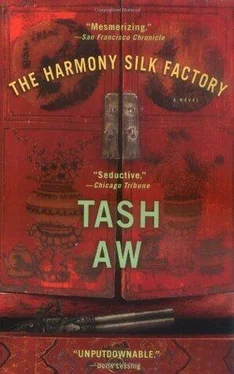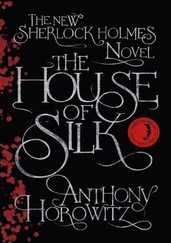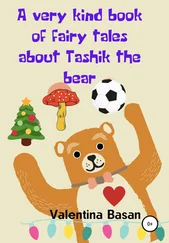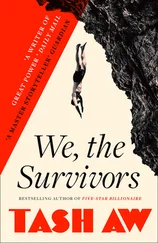1 ...8 9 10 12 13 14 ...83 “I’d use it for tablecloths.”
“This,” said Johnny, draping another length of cloth over his shoulder, “is very special.”
“It has no pattern at all.”
“That is true. But see how the light shines on it, and through it?”
“Am I to wear that?”
“Of course not. But your windows — are they big? I thought so. Use this to make curtains.”
“Curtains? Without a pattern?”
“I have seen them in the latest American magazines,” Johnny said, holding up the cloth in front of his face. “I can see you but can you see me?”
“No.”
“Next, my favourite, something so beautiful it will take your breath away,” Johnny said, undoing a brown parcel.
“It’s batik,” the White Woman said, plainly and somewhat quizzically.
He pushed a plate of pink lotus cakes toward her and refilled her teacup.
“We are exporting this,” Johnny said, dropping his voice to a whisper, “to Europe. No one knows about this yet. This is specially made for us.”
“But it looks like ordinary batik.”
“A batch of the very same material with exactly the same pattern has just been sent to Port Wellesley for shipment to London, Paris, America.”
“I see.”
The people in the shop were intrigued. This was the first they had ever heard of batik being shipped to Europe. Their minds raced. Was it possible that the same sarongs used by their grand-mothers would be used in London? How did Tiger keep this secret?
The order was placed, the notes counted out, and the goods despatched that same day to the White Woman’s home.
“You sold her batik,” Tiger said over and over again, reaching for the whisky when he learnt what had happened. “She will never come back to the shop again.” His mood lightened, however, when he realised Johnny had sold the entire stock of unsellable batik, which had languished for many months at the back of the stock cupboards. He had also got rid of a large quantity of cheap Chinese gauze at a highly inflated price. The peony-printed satin, an expensive lapse in Tiger’s judgement (he had overordered from the new mill in Singapore before he had even seen a sample), was sold without a single cent’s discount.
After a few days a note arrived from the White Woman, thanking the Tiger Brand Trading Company for always keeping beautiful yet practical textiles in stock. The note singled out Johnny for special praise, and Tiger proudly showed it to all his customers. He also began to regard Johnny in a new light.
During the time he worked in the shop, Johnny lived in a room in Tiger’s house along with several other young men and women, all of whom (so Johnny understood) worked in one way or another for the Party. Although they were all employed at Tiger’s shop, their paths did not otherwise cross. In the evenings they went their separate ways, disappearing into the night and reappearing before daybreak for their communal breakfasts, always taken at five-fifteen. Johnny wondered what kind of things they did after they slipped out of the house at night. Attending passionate lectures, plotting attacks on administrative buildings across the Valley, spying on VIPs in Ipoh, cleaning machine guns, setting booby traps deep in the jungle. Maybe they were even killing people. The thought made him shiver with excitement. He wanted to be with them.
Johnny himself had not yet experienced life as a true Communist. Up to that point he had, of course, worked in many places run by people with Communist leanings, but he had never yet been approached to do anything. Someone had given him a leaflet once. The words seemed cold on the thin paper, and did not arouse in him any feelings of duty. He tried reading some of the books on Tiger’s shelves. He reached, first of all, for Karl Marx, though he did not know why. Perhaps he had heard that name before, or perhaps the simple, strong sound of the words as he read them slowly to himself compelled him to take it into his room. Das. Ka-pi-tal. He said it several times in the privacy of his room. His lips felt strange when they spoke, and he felt curiously exhilarated. But he had not understood anything in the book. Even the Chinese version was beyond his comprehension. What the words said was plain enough, but the meaning behind them remained hidden from him. He grew to prefer the English version. Every night he would look at the book, reading a few lines in his poor English, hoping he would suddenly find a trapdoor into that vast world he knew lay beyond the page. Somehow it made him feel more important, more grown-up, as if he was part of a bigger place.
One Friday afternoon when all the shops were closed and the muezzin’s call drifted thinly across town, Johnny came across one of the other men in the garden. He was resting in the shade of a chiku tree, legs apart, sharpening a parang with smooth, strong strokes. His legs and bare torso were flecked with cut grass, and his hands rough with dirt.
“I need to light a bonfire,” Johnny said, “to burn grass and old leaves. When will you be finished?”
“I’m finished,” the man (Gun was his name) said.
Johnny started for the far end of the garden beyond the fruit trees, where he kept the tools. The steady metallic ring of the sharpening blade cut the hot afternoon air.
“Hey,” Gun said, “I heard about you.”
“What about me?” Johnny said, barely turning around.
“I heard about the Darby Mine. Everybody knows.”
“So what? I can’t even remember that.”
Gun began to laugh — a high-pitched wail, like a wounded animal’s call in the middle of the jungle. “Hey, brother, don’t have that hard look on your face. You’re a real big-time hero, don’t you know that? Everyone talks about the guy who chopped that English bastard’s leg off.”
“I didn’t chop his leg off.”
“Sure, of course not,” Gun continued, eyes squeezed shut with laughter. “Come, sit down.”
“Who told you — Tiger?” Johnny said, watching Gun carefully. The parang was balanced between Gun’s knees, glistening and hot.
“No, everyone knows. Like I said, you’re famous, brother. Why do you think you’re still alive and healthy? Why do you think you’re always able to find work? Have you thought about that? It’s because we — our people — take care of each other here in the Valley. In the whole damn bastard country, in fact. The whole bloody wide world. Do you agree?”
“I suppose.”
“Okay, look. I’ll explain something to you. Come, sit down, I said. You’re still new, fresh, as far as I can tell — even though you’re one goddam murderer already!” Gun broke into laughter once more, baring his cigarette-stained teeth. “You have backsides for brains. You have no idea about the work we do.”
“I know everything about the shop.”
Gun looked at him with narrowed eyes. “Not the shop, you goddam idiot, the army. The Communist army. M — C—P,” he said in a slow, under-the-breath voice. “Know what that stands for? Malayan Communist Party. That’s who we work for.”
“I knew that, sure,” Johnny said, kicking a clump of grass. “Where do you work?”
“You think I’m going to tell you, you bloody dogshit? You’re not one of us. Not yet, anyway. Trouble is, Tiger wants you in the shop, not out there doing what the rest of us do.”
“What do you do?”
Gun lifted the parang and held its blade erect before Johnny’s face. He looked at it with cold black eyes and smiled, showing his yellow-brown teeth. With a single fluid swipe of his arm he brought the blade down onto the ground before them. It sliced sharply into the earth, clinking against the tiny pebbles in the soil. He smiled at Johnny, the corners of his upper lip curling back hard. “That’s what we do.”
Читать дальше
Конец ознакомительного отрывка
Купить книгу












